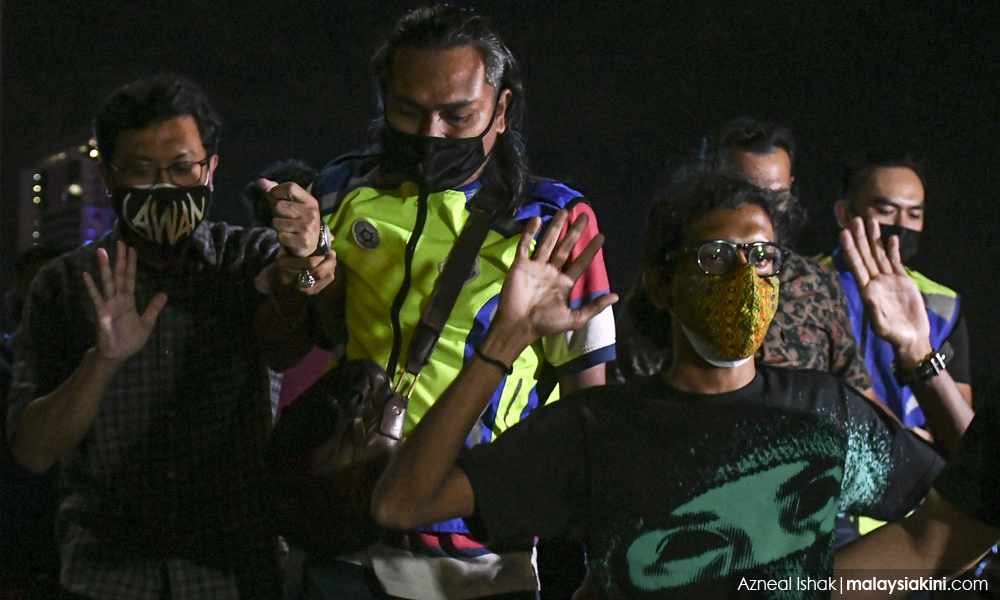On Aug 19, some 31 individuals were arrested after they had gathered for a vigil in Dataran Merdeka. The vigil was in memory of all those who died of Covid-19.
Photos and videos of the arrest made the rounds on social media, as we witnessed some of those arrested being dragged into Black Marias.
In the videos, some of those arrested had repeatedly asked the police officers whether they were under arrest. From the videos, none of the police officers answered in the affirmative.
The arrested persons were brought to Dang Wangi police headquarters, where their statements were recorded and each of them was issued with a compound notice of RM2,000 for alleged breach of standard operating procedure. All of them were released later in the night.
It was reported that the police claimed that the participants of the vigil were not arrested, but only brought to Dang Wangi police headquarters for "documentation".
However, it is quite clear from the police conduct and the fact that the participants were brought, some forcefully, to police vehicles that they have indeed been arrested.
Freedom of assembly, it goes without saying, is a fundamental right that is protected by the Federal Constitution. Article 10(1)(b) provides that all citizens have right to assembly peacefully without arms.
Over the past few years, the police have taken a slightly more tolerant approach to public assemblies, unlike the clampdowns and crackdowns a decade ago.
Of course, the police still arrested or called in for questioning, organisers of public assemblies. But it is very rare to see the police stopping and arresting protesters in public assembly these days, preferring instead to allow some room for public protests before asking the participants to disperse.

Over the past decade, the laws governing peaceful assembly have undergone major changes. In 2012, the Peaceful Assembly Act was enacted to replace Section 27 of the Police Act. The Peaceful Assembly Act was amended in 2019. Under the amended Peaceful Assembly Act, organisers need only notify the police five days before an assembly is to take place.
Crucially, under the Peaceful Assembly Act, the police cannot arrest participants of a peaceful assembly. Even if the requisite notification has not been given, that does not empower the police to arrest participants of a peaceful assembly.
The more tolerant approach by the authorities to peaceful assemblies has been moulded by various factors - changing socio-political landscape, changes to the law, and the realisation by the police that brutal clampdown on participants in the age of social media makes for negative press.
Coming back to the vigil episode, the police had erected barricades across numerous roads in Kuala Lumpur and cordoned off Dataran Merdeka before the vigil started. The police also obtained court orders against 34 organisers restricting them from entering several areas in Kuala Lumpur.
All this despite the fact that the organisers of the planned #lawan protest on Aug 21 had made it clear that the protest has been cancelled.
The actions of the police that night and the subsequent days were therefore not consistent with their approach to public assemblies these days. Even the much larger #lawan protest earlier this year was allowed to proceed by the authorities.
What is even more perplexing is that the arrests at Dataran Merdeka were made after Muhyiddin Yassin had resigned and appointed as caretaker prime minister. None of the other previous cabinet members stayed on, including the home minister.
Regardless of the reasons behind these actions of the authorities, they must still uphold freedom of speech and assembly. The protests in Malaysia over the past few years have been peaceful, and the police themselves have shown that they can facilitate public assemblies.
We cannot allow the authorities to regress to the dark days of old when public assemblies and protests were met with clampdowns, crackdowns and sometimes violent responses from the state. - Mkini
SYAHREDZAN JOHAN is a civil liberties lawyer and political secretary to Iskandar Puteri MP Lim Kit Siang.
The views expressed here are those of the author/contributor and do not necessarily represent the views of MMKtT.



No comments:
Post a Comment
Note: Only a member of this blog may post a comment.